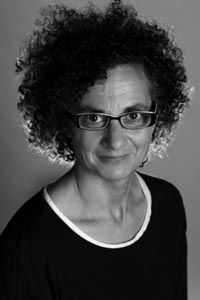![[Chronicle]](/images/sidebar_header_oct06.gif)
Vol. 27 No. 4
current issue
archive / search
contact
Past Opine interviews:
Lauren Berlant
Stephen Berry
John Boyer
David Cohen
Jerry Coyne
John Cunningham
Richard Epstein
John Frederick
Henry Frisch
Austan Goolsbee
Bernard Harcourt
Greg Jackson
Martin Marty
Martha Nussbaum
Raymond Pierrehumbert
José Quintáns
Jan-Marino Ramirez
Saskia Sassen
William Sewell
Herman Sinaiko
Geoffrey Stone
Cass Sunstein
Simon Swordy
Opine: Lauren Berlant
 Lauren Berlant | |
Lauren Berlant is the George M. Pullman Professor in English Language & Literature, the Center for Gender Studies and the College.
What book should everyone read and why?
I don’t think “everyone” needs to read or see or hear anything—but some experimental books in my post-student lifetime that helped me unlearn some unexplored habits that I held as thoughts and that helped me pay attention to other things would include: Patricia Williams, The Alchemy of Race and Rights; Carolyn Steedman, Landscape for a Good Woman; Gayatri Spivak, In Other Worlds; Deleuze and Guattari’s Kafka;Adam Phillips, On Kissing, Tickling, and Being Bored; Mike Davis, Late Victorian Holocausts; the great HUAC anthology, Tender Comrades; Linebaugh and Rediker’s The Many-Headed Hydra; Kathleen Stewart, Ordinary Affects; Fred Moten, In the Cut. Actually, in my field, essays are more likely than books to crack people open, I think. These days, I watch a lot of ficto-documentary film and writing, read fiction and listen to a lot of Ornette Coleman and get the same effect, too. But that’s just what I “should” do.
What American citizen, who is a well-known public figure, is a role model for America's younger generation? What qualities does this individual possess that are worthy of being emulated?
I am not so keen on the language of role models and heroes, although I understand that this genre is given to people to sustain their optimism that some ordinary human agency can organize world-magnificent effects. Nelson Mandela, for example, and Zackie Achmat, Fannie Lou Hamer Adrienne Rich—people who were not defeated by the ridiculousness of concrete political hope. But all of them worked (or work, like Achmat) not as autonomous individuals but in movements and from them.
What advice would you give to your best student who plans to follow a similar career path you have followed in teaching and doing research?
People enter history at different historical moments and therefore amidst different conditions of possibility: there are no really similar paths. This is a hard job that provides no internal limits on time, labor, or mental or emotional attention. Therefore the archive and the labor of teaching, researching and writing have to give you great energy, joy, and release new communicable potentialities in you if you’re going to do them, because the profession is also taxing and incoherent in its demands. If you’re doing it (becoming an English teacher) to have a serious political impact, it’s a mistake, in my view. You write things hardly anyone reads and talk to a limited number of people. Changing the world and helping people learn to think about something are really different things. As they’re not entirely unrelated, though, there’s a seduction to think they’re the same.
How has information technology changed your life?
It’s made scholarship a lot more fun, and collaboration a whole lot easier.
Think of a renowned scholar from the past who added great value to your area of study. What would this person think of the advances that recently have been made in this field?
Kenneth Burke would love the new work in affect theory that is reinvigorating the scholarship on the relation of political and aesthetic form, motive, subjectivity and practical/political agency. On the other hand, any old socialist would be shocked at how changed politics is, from the old left sense of socialism-as-democracy to the new anarchisms and precarious movements that are much clearer and bonded in their (anti-neoliberal) critique than they are in their political claims, aims and imaginaries.
What lesson or lessons has America not yet learned from its history?
Why are these questions so nationalist?
In your opinion, where do science and art meet?
Where don’t they meet? A huge and flourishing scene of global contemporary art practice collaborates with genetics, physics, bio-ecology, and communication technology. In my world they’re separate only in a disciplinary sense, not a conceptual one.
What are the three most important things to apply when making an argument for something you believe in—(e.g., academic freedom)?
I don’t understand this question. Do you mean, is there a method for understanding the complexity and lability of an intellectual object or question? Is there a way of addressing the object/question to generate a context for it that transforms what one can learn from it? Is there a way to hold incommensurate kinds of argument and evidence in proximity to the object/question without homogenizing either them or it into a singular idiom?
If you could choose any three University professors and give them a one-year sabbatical together to solve a problem, develop a theory or make a discovery, who would they be and what task would you assign them?
I’d get people with luscious minds like Cathy Cohen and Patchen Markell and Candace Vogler together to think about what binds persons to social worlds and what kinds of action and art (in the Greek sense) might open up more capacious senses and practices of sociality, political and otherwise.